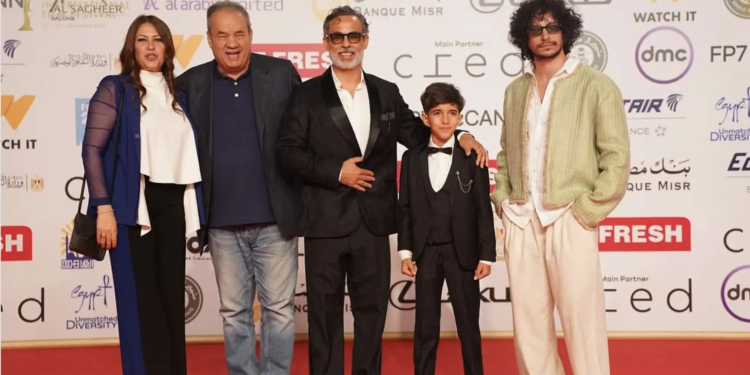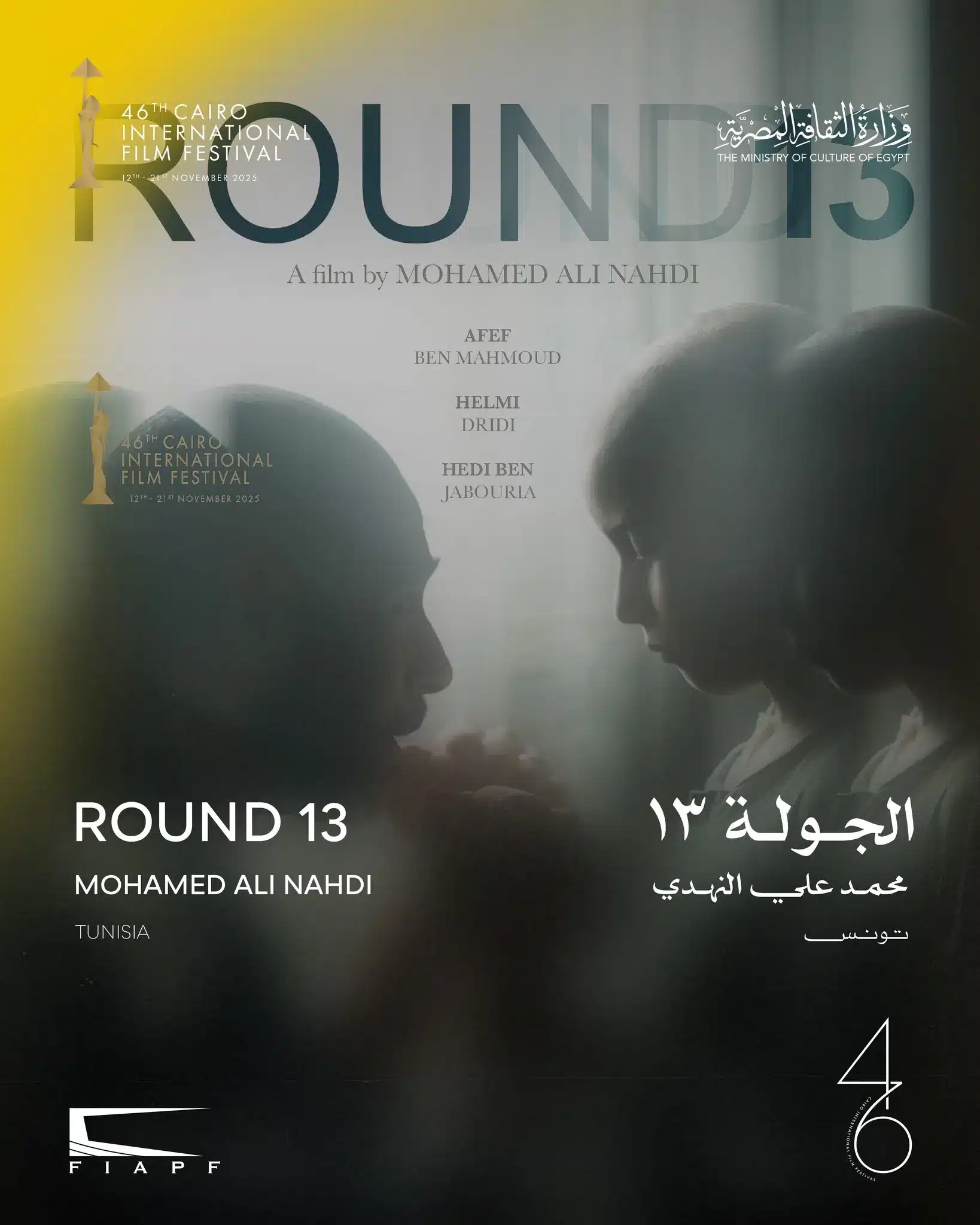At the 46th Cairo International Film Festival (CIFF 2025), Round 13 by Mohamed Ali Nahdi is presented to audiences in the Horizons of Arab Cinema competition, at the heart of a section devoted to contemporary Arab filmmaking. The film’s team, arriving straight from Estonia after its world premiere at the Tallinn Black Nights Film Festival, accompanies this profoundly Tunisian work as it moves from a major European showcase to one of the most important events in the Arab film world.
Round 13 unfolds along two parallel lines: the examination of a Tunisian social reality, and the intimate portrait of a family confronted with the unthinkable. Directed by Mohamed Ali Nahdi, written by Sophia Haoues with the director’s participation, and featuring performances by Helmi Dridi and Afef Ben Mahmoud, the film transcends its boxing backdrop to tell a story in which life’s trials take the form of a final, decisive round.
The starting point is stark and devastating. Kamel, a former boxing champion who has left the ring to build a quiet life with his wife Samia and their son Sabri, sees this fragile stability collapse when both parents learn that their child has a malignant bone tumor, after what seemed to be nothing more than a minor fall. The diagnosis sends the family into a succession of shocks and upheavals: the ordeal of a gravely ill child, the weight of complex treatments, the omnipresent fear of death, the father’s gradual descent into anger and helplessness, the mother’s unwavering resolve to hold on to hope, and the child’s silent courage. These elements shape the film’s first major layer, one in which illness becomes a revealer of each person’s strengths, limits and vulnerabilities.
One of the film’s greatest strengths is its refusal to sink into melodrama or emotional manipulation. Round 13 is not designed to make audiences weep; it seeks neither sentimentality nor pathos. Its purpose is to depict and to denounce. And yet, tears may come—especially to those who have lived through something similar. The illness of a child, particularly one so young, and the looming threat of their death, remains one of the most harrowing human experiences imaginable. Accepting the possible loss of one’s own child is beyond unbearable, and the film lets this horror surface without underlining it or exploiting it, allowing it instead to emerge naturally through gestures, silences and glances.
But Round 13 goes beyond the individual drama. The film reflects a Tunisian reality familiar to many families from disadvantaged backgrounds facing serious illness in the household. The shock of the diagnosis, in a country where lengthy and costly treatments immediately generate financial anxiety, is compounded by an equally harsh truth: the public hospital system does not fulfill its role. Long queues, delayed exams, unavailable prescriptions and chronic administrative bottlenecks are central in the film’s backdrop. Expectations are enormous, often desperate, while private-sector healthcare is financially out of reach for most families. Added to this is the medication crisis that has affected Tunisia for years, where essential drugs are frequently unavailable, forcing families to search endlessly, turn to the black market or give up on proper treatment altogether.
This social anchoring forms the film’s second major axis, addressed directly and without embellishment. A child’s severe illness is not only a family tragedy; it exposes systemic fractures. The film shows how precariousness merges with emotional distress, how the inability to access timely care intensifies tensions at home, how fatigue, fear and financial pressure reshape the relationships between parents and child. In Round 13, medical and administrative obstacles are not secondary elements—they are part of the battle itself, as decisive as the diagnosis.
In the midst of this storm, one truth stands out unmistakably: the mother remains the family’s anchor. Samia holds everything together when everything else unravels—her home, her son, her husband—and pushes forward despite exhaustion and fear. This is no coincidence. In Tunisian society, it is often the mother who embodies this central force, the one who stays upright no matter what, the one on whom everyone relies when hardship accumulates. The film highlights this through observation rather than proclamation: simply watching her is enough to understand the structure she sustains.
This context also explains Kamel’s downward spiral, driven by the double collapse of his son’s health and the failure of the institutions meant to protect him. An altercation, born of accumulated tension, leads to his arrest. When he is released, time has passed, and the film shifts toward a “final round,” not in a boxing ring but within the fragile intimacy of a home trying to rebuild itself amid illness, fear, financial strain and emotional exhaustion.
The cinematic language of Mohamed Ali Nahdi draws on his own trajectory as both actor and filmmaker. Trained at the National Theatre of Tunisia and later at the Conservatoire Libre du Cinéma Français in Paris, he has developed a sensibility attentive to emotional nuance and intimate journeys. Round 13, his second feature after Moez, extends this approach within a contemporary Tunisian cinema that explores social reality through deeply human stories. Choosing to confront such a heavy theme—childhood illness—while anchoring it in the daily life of modest families situates the film squarely within one of the most direct and unvarnished traditions of Tunisian storytelling.
Beyond its narrative structure, the film owes much to the strength of its performances. Helmi Dridi and Afef Ben Mahmoud deliver finely tuned portrayals of a couple overwhelmed by circumstances, each responding according to their own inner resources and vulnerabilities. But it is the young actor, Hedi Ben Jabouria, who leaves the deepest impression: his face, his gaze, his physical presence convey illness with disarming authenticity. The makeup, applied with remarkable precision, gives the child an appearance of fragility and decline—a flickering light that accompanies suffering bodies—without ever drifting into exaggeration or artificiality. A measured, balanced approach designed to allow the illness to exist on screen with sobriety and credibility, enabling the audience to grasp the child’s extreme vulnerability without ever feeling that their emotion is being imposed upon.
The power of Round 13 may lie in this: even rooted in a distinctly Tunisian context, it speaks to something universal. The illness of a child, the fear of losing them, the vertigo that overturns all logic and hierarchy—these are experiences that transcend borders, languages and social classes. No healthcare system, however robust, can soften the brutality of such a blow. By showing this pain within a Tunisian setting, the film reminds us that it could emerge anywhere, in any family. And perhaps its true journey—from Tallinn to Cairo, and soon to other festivals such as those in Morocco and Iran—resides in its ability to carry an emotion that knows no boundaries, and to raise a question that concerns us all, beyond contexts and cultures.
Neïla Driss









